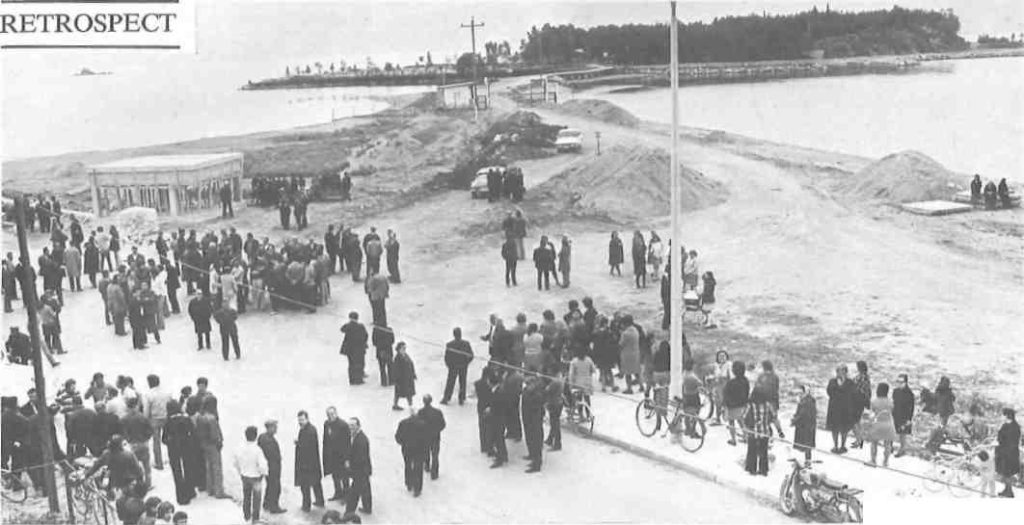There recently took place in Eretria a curious spectacle which should be of interest to natives, residents and travellers alike, as it concerns all of us. A trial took place on a beach. One Saturday a few weeks back a table and a chair had been carried out of a taverna nearby to accommodate Mr. Christos Koukopoulos, Justice of the Peace from Halkis. Before him stood a newly-constructed concrete guardhouse, heaps of sand and wire fencing, and around him had gathered hundreds of irate villagers. Fittingly, the scene was dominated by the adjacent sea, for this is what it was all about.

People were amused to call it the Third Eretrian War. The first had been the Persian landing of 490 B.C.; the second a sacking suffered at the hands of the Romans in 198 B.C. The third and present intruder was an organization called Euboean Tourism, S.A.
For four years the war against Eretria had been plotted by the Persians. The plotting this time had lasted twelve.
In 1962 a company called the Athens Tourist Works, S.A. — whose governing board included its president, a gentleman from Athens, his mother, Terpsithea, and his gardener — acquired from the community a 3Vi acre peninsula called Pezonisi at the entrance to the harbour at Eretria. This pine-clad area surrounded by water — for the sand-spit which connects it with the mainland is submerged at certain seasons — was a favourite resort in those days of local people: strollers, anglers, lovers of nature, and other sorts of lovers, too. It was an ideal spot for assignations. (The amorousness of the otherwise dormant Eretrians has been celebrated since antiquity and is attributed to the drinking water. Hopefully this is so, as its brackishness today in no way gratifies thirst). Twelve years back, of course, no one actually went into the water except to scrub down a donkey or dive for clams. Only the very infrequent foreigner from Athens, or places more remote, were seen to submerge themselves for pleasure. This may explain why the community leased the land in question to the tourist company for a mere 15.000 drachmes per annum. The property, in any case, was to revert to the town in ten years’ time.
A tourist complex was duly built, consisting of bungalows, restaurant, bath house facilities, a connecting bridge and, to the surprise of many, a guardhouse and gate where an entrance fee was to be paid not only by foreigners but by natives also.
Between 1962 and 1967 the Athens Tourist Works, S.A., applied four times for an extension to its lease. Four times it was refused. In these years the village had much altered. Villas rose along the beach built by Athenians of note. It became popular with weekend excursionists. The Swiss Archaeological Mission began to uncover antiquities of absorbing interest. In short, Eretria became fashionable, not only with those who pursue pleasure, but also with those who seek after Beauty and Truth. In the meantime, too, the natives had acquired a taste for sun and sea bathing. Old ladies half-buried in sand and protected by black umbrellas pronounced miraculous cures for arthritis. People even came down from far-off hills in donkey trains to sport on the beaches and in the shallows.
In 1968 the island passed into the hands of the National Tourist Organization. Two years later, the National Tourist Organization rented the property on a lease terminating in 2039 A.D. to a company called Euboean Tourism, S.A* Among the members of the board was the president (a gentleman from Athens), his mother, Terpsithea, and his gardener.
At this time great improvements were made to this tourist paradise. A nightclub was added, splendidly outfitted in a nautical decor and with such elaborate megaphonic equipment that not only the clients but the whole community could keep abreast of the latest songs until two, and sometimes four o’clock in the morning.
The next four years showed a noticeable deterioration in the relations between the town and the tourist centre. Complaints to the local police increased. There were ‘night incidents.’ There were rumours. There was also an interesting piece of evidence being circulated. A city plan of Eretria had been unearthed, drawn up (and officially approved) by the Bavarian town planner, Demayer, in 1835. It was at this time too, people were reminded, that King Otto himself had given Pezonisis to the community by royal decree. On careful perusal the area claimed by Euboean Tourism, S.A., was found quite clearly to be not only on public, but on town land.

Finally, in March of this year, came an act of what seemed deliberate provocation. One morning bulldozers arrived, accompanied by great rolls of mesh fencing and concrete mixers. Euboean Tourism, S.A., was extensively widening its beachead and beachfront. It claimed to have an official permit to do so.
An ominous calm fell on the community. It was difficult to detect, for calmness to the point of stupor is indigenous here in late winter. The first call to arms came in church during the service of the Last Salutations. It spread in whispers like grass fire. Amid the clouds of incense and devout signs of the cross, the murmurs were audible: Ά court judge? On the beach? Tourist lawyers? Town lawyers? State lawyers? Let’s stick together! Everyone be there!
Saturday morning the battlecry was sounded by the ferry boats. Their tooting sirens were the signal to bring in the people from the fields. Shops began closing all over town. The ferry personnel and the construction workers were given two hours’ leave. Housewives banked down their fires to delay the midday meal. Grandmothers set aside their distaffs and turned off their television sets.
At eleven o’clock his honour, Mr. Christos Koukopoulos, Justice of the Peace from Halkis, arrived. The villagers gathered. The trial got under way beside a sand dune, the work not of nature but of the bulldozer. The names in the case were announced. The signed petitions of the people were presented. Then came the hearing. Mr. Papacharalambos, representing the town and a native son, rose to the grandeur of the occasion.
‘What is this sentry box before us guarding?’ he asked. ‘What is this fence going to keep out? Whom are these gates being turned against? I will tell you: It is against us, the citizens of Eretria! Why? To prevent us from the use of our own beach, or to force us to pay for it!’
Winged words, indeed! The villagers warmly applauded.
Our own town plan gives us here a boulevard 24 meters wide, a great market; public area, all of it. And what do we see before us: a guardhouse to keep us out!’
His listeners warmed to the outrage. Nevertheless, the president of the board of Euboean Tourism, S.A., was given a fair hearing.
He claimed that his company had improved the area at vast expense, brought tourism by which the whole town benefitted, and that he planned to build the fence only to safeguard his materials and equipment for further improvements. When he was asked how much area he needed to pile up his materials and had replied, 500 square metres, Mr. Papacharalambos offered a piece of his own of equal size hardly 150 meters from the site. The gentleman from Athens demurred. Several , witnesses followed. The defendent then requested that the trial be adjourned and continued in Halkis. The request was granted.
There have been several hearings since. The decision is still pending. There is much talk of town rights and state rights. The very existence of the permit so offensive to the good people of Eretria has itself been questioned, and where it will go, or how, is very much in the hands of those higher authorities who are the protectors of the nation. The Court of Appeals had been notified, Ministries of state are concerned, and the interest of the Supreme Court itself has been aroused.
And this is all very much as it should be, for in a country in which land and sea are so intermingled and interdependent, its geographical heart lies along its seafronts. Where so much of its past glory has been won, must not its beauty, too, now be most zealously protected? And must it not be free?
The people of Eretria have gone home again. They have raked out the fires, taken up the distaff and turned their television sets back on. But in a moment of crisis, however local and surely not unique, for it can only have been a variant of a problem common enough in this country, the people of Eretria rose once more out of their slumbers to proclaim the national honour.
Our mercurial intelligencer reports victory for the Eretrians. Fences will not rise. The Prime Minister, in response to an appeal from the people of Eretria, reversed the decision of the Halkis magistrate which favoured the invading complex, thus ending the war of words. Open season returns to the beach.







